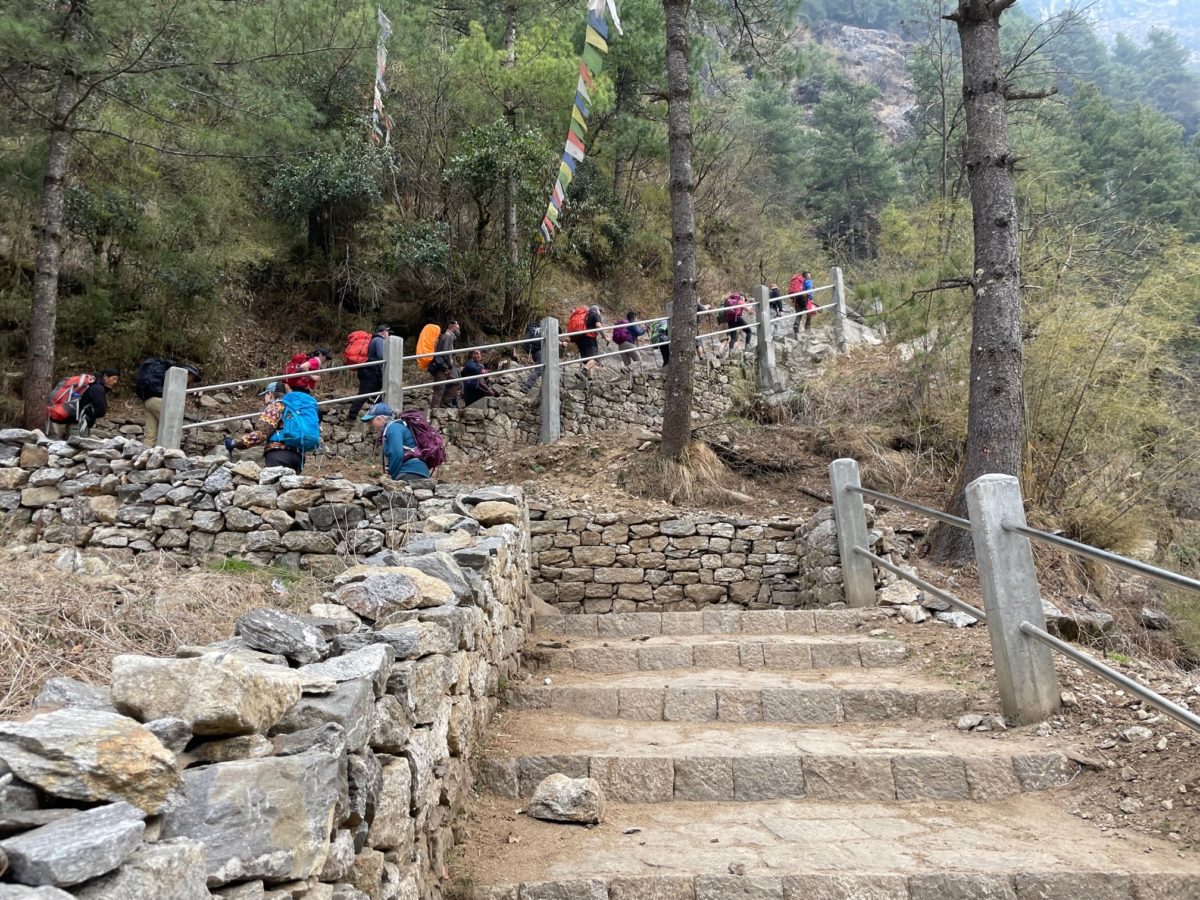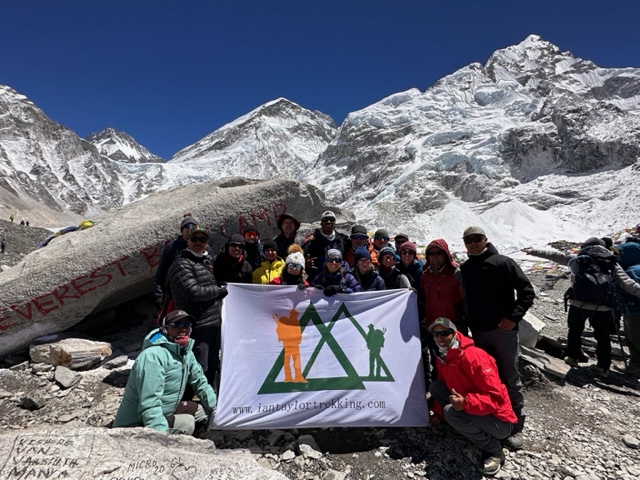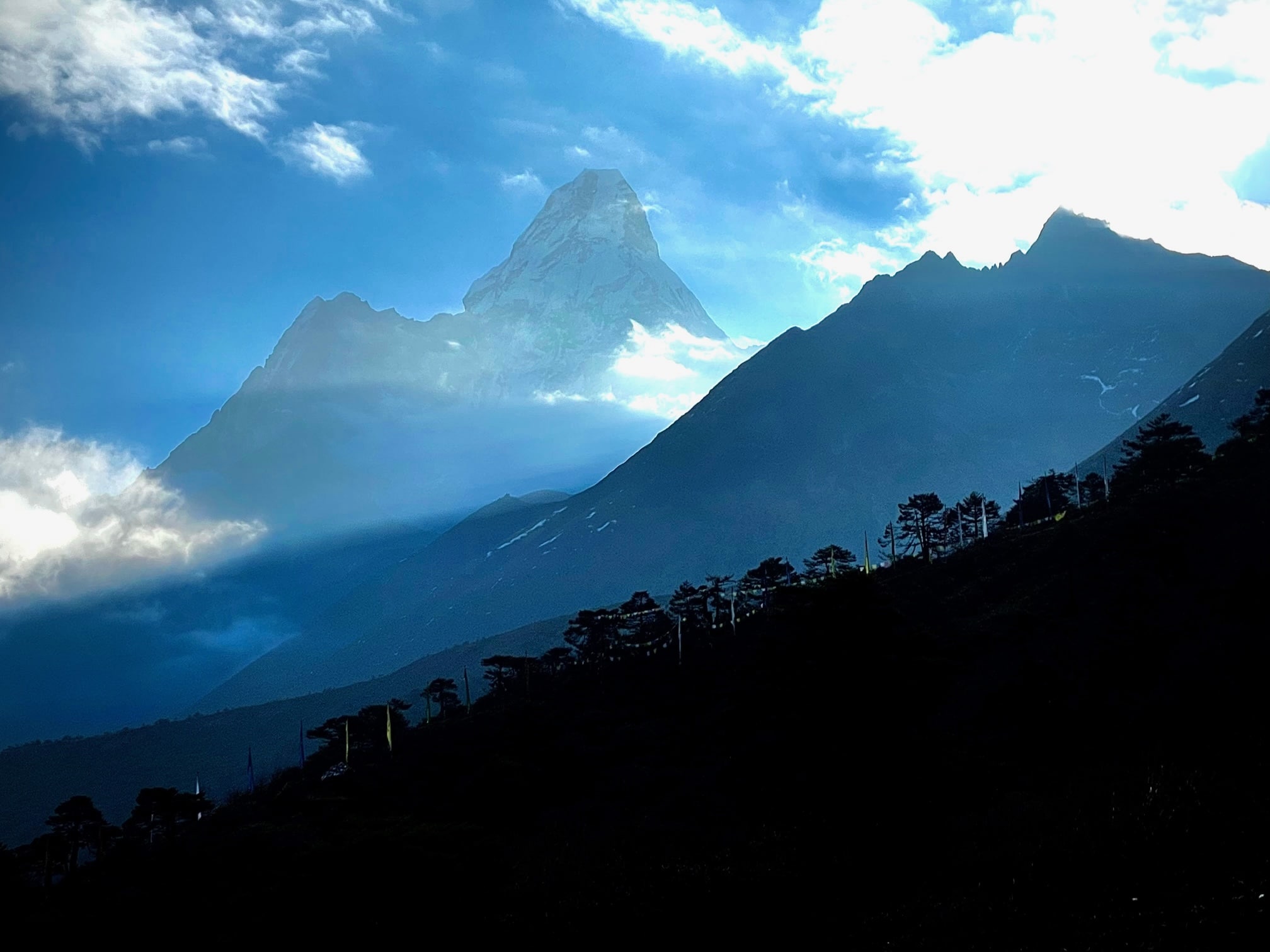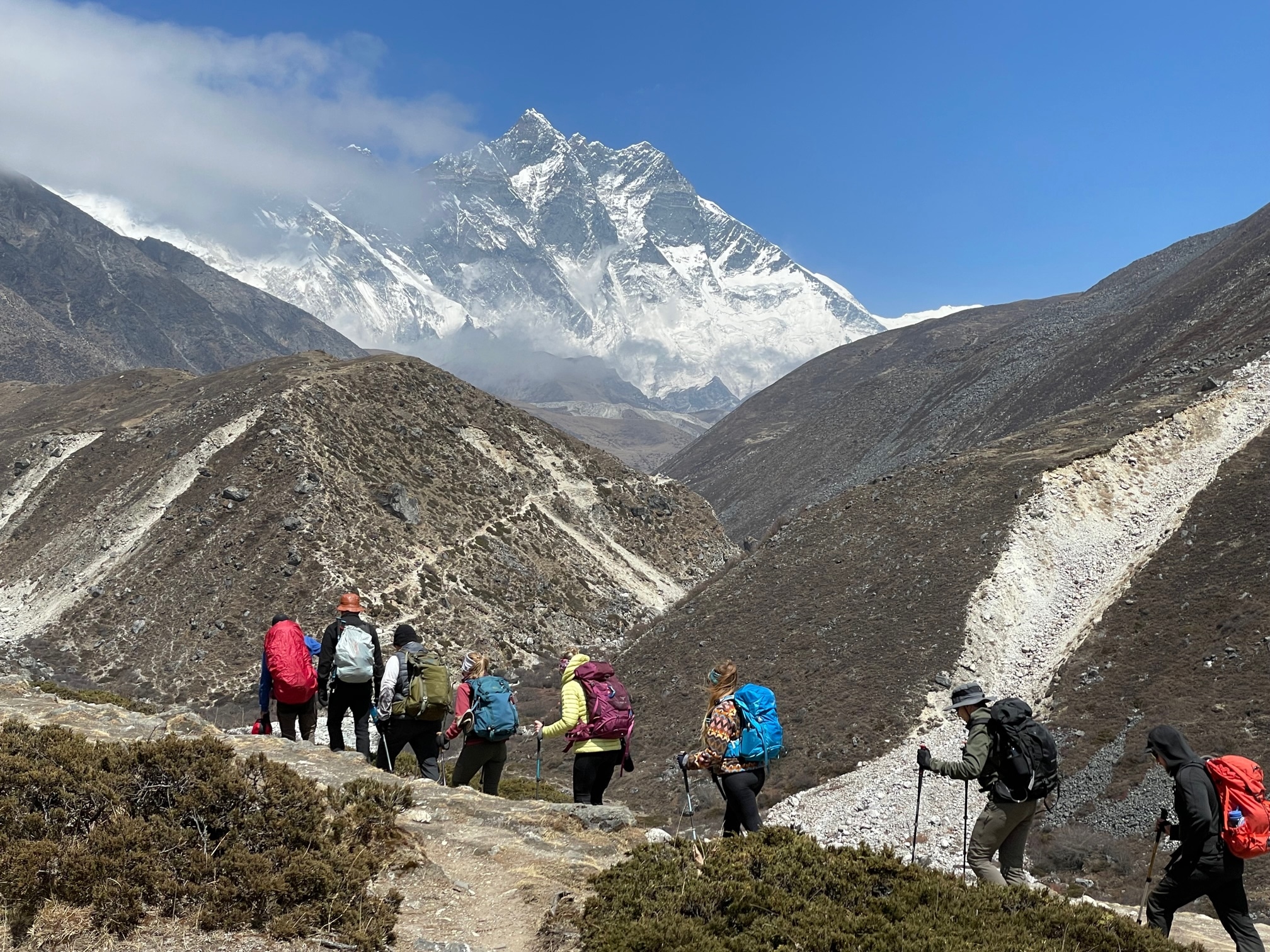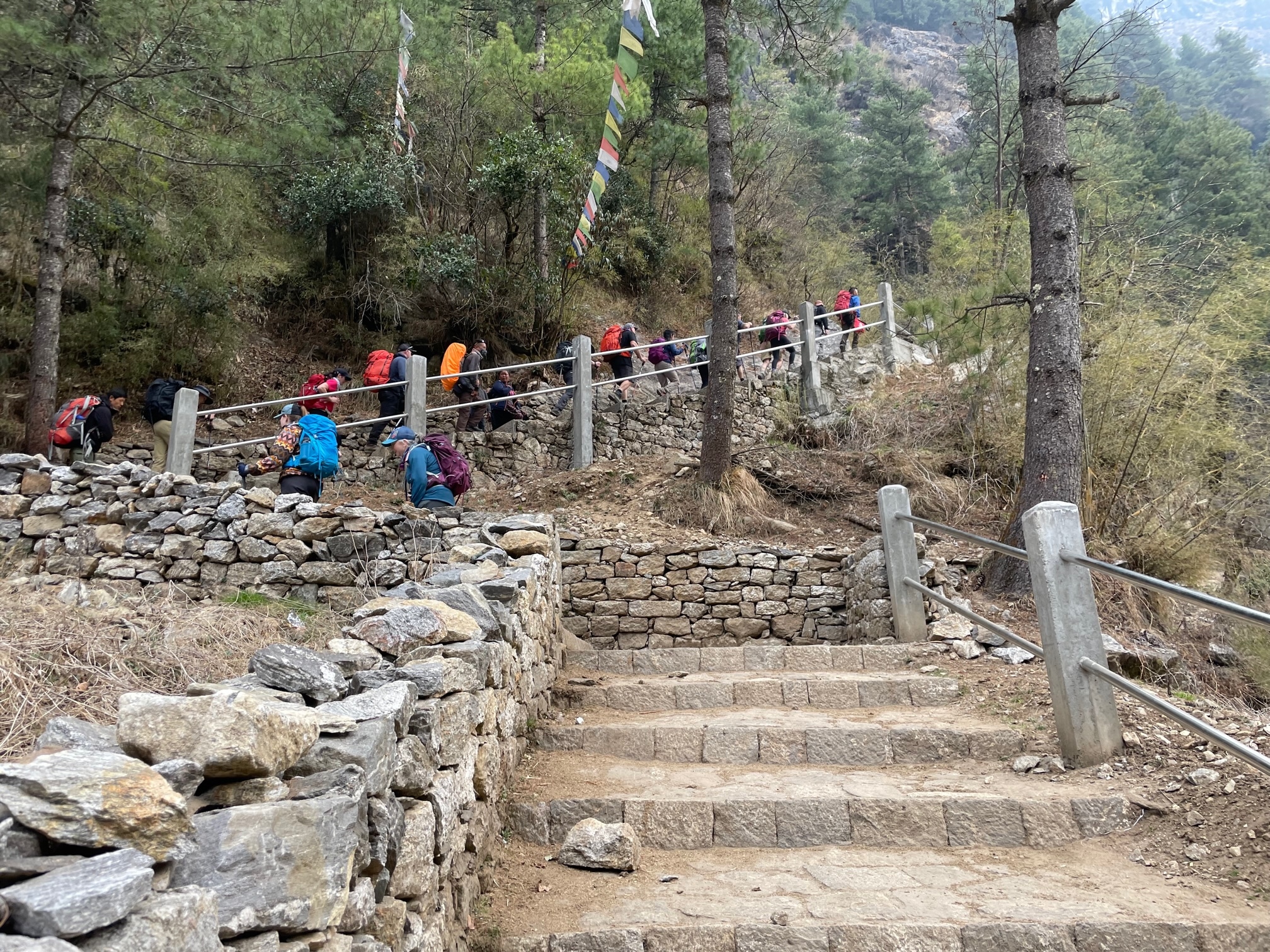Here are the elevation gains for our Mount Everest Base Camp Trek. Coming on the Everest Base Camp trek with the correct physical preparation will be paramount in whether or not you can safely and successfully reach Everest Base Camp, Kala Patthar and all the way back to Lukla. Check out our sleeping at Everest Base Camp page and upcoming trips.
Why Elevations are Important to Review
There are a few major factors you need to consider when preparing for your Everest Base Camp Trek. When you combine the elevation gains, the daily distances, the weight you will carry on a daily basis, and the lack of oxygen in your body, you will then be able to formulate the correct training plan for your EBC trek.
Daily Everest Base Camp Elevation Gains Help You Develop a Training Plan
The reason why an elevation gain calculation is so important to your training is so that you can make sure you are reaching these gains in your daily training and can build up to doing this on a multi-day basis during an EBC trek.
Once you sign up for one of our Mount Everest Base Camp treks, we are happy to assist and advice you on the correct training program for your Everest Base Camp experience. CONTACT US, and we can help you fully understand the challenges that Mount Everest trekkers often face.
Breaking Down the Mount Everest Base Camp Elevation Gains
Here is a short breakdown of the elevation gains for our Everest Base Camp treks in Nepal. If you are on one of our Sleeping in Base Camp treks, days 9 and 10 will be slightly different than the information below.
Day 1). The Lukla Flight
Firstly, we prefer to use helicopters to access the Everest region. The weather can be challenging even in the better trekking months and best to get the trip off and running.
The Lukla airport (officially called Tenzing-Hillary Airport) sits at a height of 2,850m/9,350 feet. From there, you will walk through the town before going downhill for 315m/1,033 feet. After that, you will then head back up 315m/ 1,033 feet over uneven terrain.
This hike today will take approximately 6 hours. We always aim to reach Monjo (a small village in the Khumbu region) on the first day of our Everest Base Camp trek. However, if we arrive late in the mountains, we aim for Phakding, which takes 3 hours. There are lots of steps up and down in this part of the EBC route. Distance: 13km/ 8.8 miles
Day 2). Namche Bazaar
If we have made it to Monjo the day prior, then you will start your Everest Base Camp trek with a hike up 740m/ 2,427 feet uphill, over suspension bridges on uneven terrain to reach Namche Bazaar. There are some short downhill sections on steps, and it will take approximately 4 hours to reach Namche.
After crossing through Jorsalle and into the Sagarmatha National Park, you drop downhill over another suspension bridge before hiking alongside the river and up steps to the high suspension bridge. From the high bridge, you need to pace yourself as it will take two hours (uphill) to reach the Sherpa village of Namche Bazaar in the Khumbu region. Distance: 8km/ 5 miles
Day 3). Acclimatization Day
We spend 3 nights in Namche Bazaar, which greatly aids in your acclimatization and therefore gives you a safer and more successful ascent on your Mount Everest Base Camp trek. You hike up 120m/ 400 feet to the Sherpa Museum to acclimatize before high-altitude trekking. 5 things you need to do in Namche.
This is just a short 30–minute hike each way. The team will relax up at this elevation for a few hours, learn more about the Sherpa culture and the Sagarmatha National Park, and keep adapting to the lower levels of oxygen, which will be common during an Everest Base Camp trek. Distance: 1km/ .6 miles
Day 4). Acclimatization Day
Today is the second one of our acclimatization days in Namche Bazaar. Having three nights in Namche gives our clients the best chance of a safe and successful Mount Everest Base Camp hike. Today, the team will hike up 460m/ 1,500 feet up and 460m/ 1,500 feet downhill.
Shangboche hill offers the best panoramic view of the Everest region. Most people cram into the Everest view hotel. We don’t go here as the view is not as good and there are too many people. If everyone is feeling good there is an option to visit Khumjung village and the local monastery.
Also, we will take approximately three to four hours of trekking. The trail will take the team up and down steep steps up out of Namche Bazaar to Shangboche Hill. However, the natural beauty visible from Shangboche Hill (which you might have seen on National Geographic before) will be worth the effort! More acclimatization will help you in high-altitude trekking and lower the risk of acute mountain sickness. Distance: 3km/ 1.8 miles
Day 5). Tengboche
Today we will hike out of Namche Bazaar and then traverse the side of the mountain, gaining 260m/850 feet of elevation. Then, you will drop down 300m/ 984 feet to the lunch spot. After lunch, you will have the steep uphill Tengboche Hill, which is 600m/ 1,968 feet.
This hill alone takes 1 hour 45 minutes to ascend up to Tengboche. The total time for trekking today is about six hours. This is another challenging day of our EBC trek for a lot of people. Pacing, hydration, and lots of prior training before this part of your Everest Base Camp trek are essential. Distance: 12km/ 7.5 miles
Day 6). Dingboche
Today you will first hike down 110m/ 360 feet to the riverside and then go back up 518m/ 1,673 feet, passing through upper Pangboche to visit the local monastery and see the yeti hand and skull.
This is just above the main route to Dingboche. The hike today will take approximately six hours, and you will reach a new height record during this Everest Base Camp trek. Distance: 12km/ 7.5 miles
Day 7). Acclimatization Day
Our Everest Base Camp trek trips all spend 2 nights in Dingboche to further aid in the acclimatization process before reaching the peak of the world’s tallest mountain. Today, you hike up 490m/ 1,600 feet and back down 1,600 feet. This part of the EBC trek will take about four hours and this is an important acclimatization day.
The mountains start to get very close, and if the weather is clear, this is one of the best mountain scenes you will ever see. Distance: 3km/ 1.86 miles
Day 8). Lobuche (by the Khumbu Glacier)
Today you will move towards Lobuche, located close to the Khumbu Glacier. Firstly, you will move on gradual terrain as you hike out of Dingboche toward Thukla. The total eelvation gain today is 520m/ 1,700 feet.
You will reach Thukla for your early lunch. After lunch, you will begin the uphill trek up the Thukla Pass. This trek will take approximately 45 min to one hour.
At the top of the Thukla Pass, you will have time to enjoy a break at the Mount Everest Memorial. Then, from the Memorial, the incline is more gradual uphill to Lobuche. The total time hiking today will be approximately five hours. Distance: 12km/ 7.5 miles
Day 9). Everest Base Camp Trek– Gorak Shep
Today is your day. You will hike up 400m/ 1,300 feet and down 183m/ 600 feet into Everest Base Camp. Today should be approximately seven hours of trekking. You will leave at 7am and will arrive at Everest Base Camp by midday or 1pm and aim to be back in Gorak Shep by 4pm.
Today is a long and challenging day, but you will finally reach your goal of Everest Base Camp. Do consider joining one of our sleeping at Everest Base Camp. Distance: 10km/ 6.2 miles
Day 10). Kala Patthar – Pheriche
Today is also a big and special day of your EBC trek. One of the main reason to make this trek is to ascent Kala Patthar 5,645m/ 18,520 feet. I have been up Kala Patthar over 50 times and worth the effort. You will wake early, before sunrise to begin the hike up to Kala Patthar. The total hike today will bring you uphill 465m/ 1,525 feet, and down 1,127m/ 3,700 feet.
The total time of your Everest Base Camp hike today will be around eight hours! This is another long day hiking up Kala Patthar early in the morning and then returning to Gorak Shep 5,180m/ 16,995 feet for breakfast. Then, you will continue down the trail past Lobuche all the way to Pheriche. Distance: 18km/ 11.2 miles
Day 11). Namche Bazaar
You will be up early today for the long road back to Namche Bazaar. Overall, today you will hike down 1,000m/3,280 feet and up 350m/1,148 feet on route to Namche Bazaar.
Today is another long day. However, reaching Namche and the hot showers in your room will be a treat! The total journey today will take about eight hours. Distance: 22km/ 13.7 miles
Day 12). Lukla
This will be the final day of your EBC trek as you make your way back to Lukla. We will aim to get back to Lukla in the early evening after a long day of trekking. The return flight back from the Tenzing-Hillary Airport to Kathmandu Airport will be the following day.
You will hike down 700m/ 2,296 feet, and up 365m/ 1,200 feet on the last day of your EBC trek. The total time of hiking is around eight hours, however, once you reach Lukla, you know that you have completed your goal – you have finished your Everest Base Camp trek! Distance: 21km/ 13 miles
The Everest Base Camp Elevation Gains for Our Trek
If you are looking to learn more about the EBC trail and how many miles you will cover each day, check out the daily distances on our Everest Base Camp trek.
The Everest Base Camp elevation gains in Nepal are a crucial element of the trek to Everest Base Camp. Therefore, you need to build up your training around the sort of elevation gains you will be doing on your EBC trek.
Also, remember that during your Everest Base Camp trek, you will be getting 30% to 50% less oxygen getting to your muscles. Your body will be under more pressure to adapt, so you need to have the physical conditioning for the distances and elevation up and down. On top of that, remember that the Mount Everest Base Camp altitude is cumulative, therefore, the higher you go the harder it gets.
Everest Base Camp Trek Training Advice
In preparation for the Everest Base Camp elevation gains in Nepal, you also need to build up to training with a weighted backpack. You should be building up to the elevation gain trek training with double the weight you will be carrying each day on the trail.
For example, you will be carrying approximately 6kg/13 lbs on each day of the EBC trek. You will have your backpack, 2 liters of water, rain gear, sun cream, a camera, snacks, a small personal medical kit, and possibly an extra layer of clothing higher up.
Therefore, you need to be building up to the EBC trek training with twice the weight at sea level. This will make sure that you are getting the right conditioning into the muscles. You will also be gaining the endurance, fitness, and muscle memory needed to make the Everest Base Camp trek a safe and successful one.
For more information about how difficult it is trekking to North Base Camp, read more here. Then, with the combined information, you will be able to formulate how much training you will need before your EBC trek to prevent altitude sickness and other unpleasant conditions. The Everest Base Camp elevation gains will be very helpful in determining that!
Get in Touch Today for the Best Mt Everest Base Camp Trek
If you are ready to take on the challenge of an Everest Base Camp trek, then GET IN TOUCH with us today! Our team has the information and experience you need to give yourself the best chance to visit Everest Base Camp safely and successfully.
In addition, our teams have four guides for every group of ten trekkers, and safety is our number one concern. Let us help you reach the base of the World’s Highest Mountain! Follow us on Instagram and plan your next trekking season with our team. We will do our utmost to organize the best Everest Base Camp trek you can think of.

